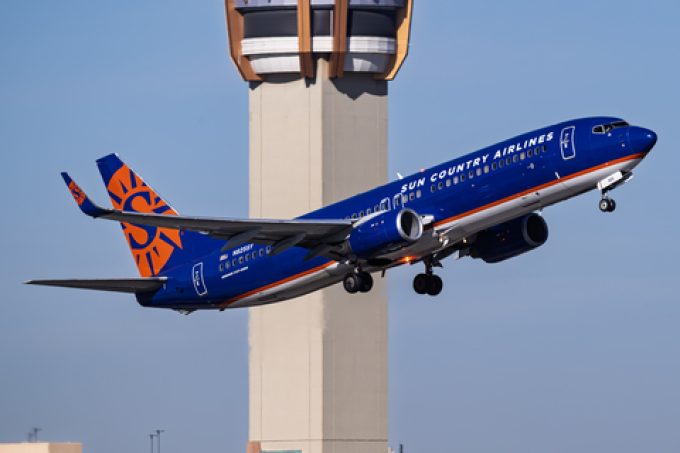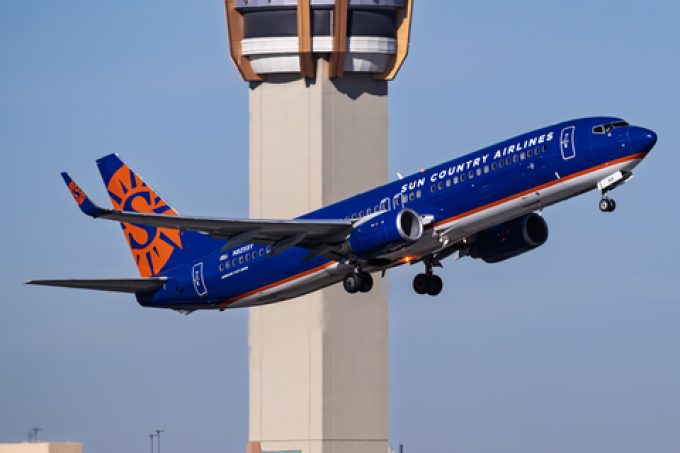
© Robin Guess |
Apollo Global Management, owner of Atlas Air, has sold its remaining 12% of Sun Country Airlines, despite the airline’s bullish stance on its Amazon contract.
The private equity group bought into the airline in 2018. In 2020, the carrier signed a deal with Amazon to sub-lease 10 aircraft, which was extended in 2023 to include eight more.
All eight will join the fleet, to take it to 20 freighters, by this summer, according to CEO Jude Bricker.
“I expect cargo revenue will roughly double by this time next year,” he told investors in an earnings call last week.
Cargo revenue at the carrier hit an all-time quarterly high in Q4 24, to $28.6m, up 13.1%, despite a 2.5% decrease in block hours: Amazon contract rate increases kicked in last June.
Dave Davis, president and CFO, explained: “Q4 cargo revenue per block hour was up 16%, driven by the impact of a portion of the rate changes implicit in our extended Amazon agreement as well as annual rate adjustments.
“We continue to expect cargo flying to inflect sharply upward in 2025, as we take on an anticipated eight additional freighter aircraft throughout the year. One of the freighters has already been delivered and we expect it to enter service in late Q1.”
Total cargo revenue for the year was $107m, accounting for about 10% of total revenues.
Mr Davis added that “the revised Amazon contract rates will continue to escalate as we receive additional aircraft and will not be in full effect until the second half of 2025”.
The airline’s total block hours will increase between 9% and 10% this year, he said, with Amazon’s extra aircraft driving most of the growth.
However, much depends on the “exact” delivery dates for Amazon’s 737-800Fs, which are transferring from Atlas Air, he warned.
“We expect them to start service in March, and then enter service throughout the year. They should all be in by late summer into the fourth quarter.”
Analysts asked if the carrier’s cargo operations would be impacted by tariffs. Mr Davis said tariffs were currently “difficult to assess, especially given that we have one customer”.
He explained: “There’s no set minimums [in the Amazon contract], but the way this contract is constructed is there is a fixed rate per aircraft and then a block hour rate on top of that. So it operates as sort of a de facto minimum, because we get paid for each aircraft.”
Sun Country has begun to redeploy pilot capacity to the best routes, added Mr Bricker, when aircraft are under-utilised.
“Generally speaking, the lower the utilisation of the cargo fleet, the better the margins are for us, because we can redeploy that pilot capacity most of the calendar into more high-margin flying. And then you mentioned the load on the airplane.We can fly empty or full. It doesn’t matter, the rates are the same.”
Amazon Air Cargo, which last year announced it was opening up its capacity to third parties, reportedly asked Sun Country to keep one aircraft open for charters, although observers have questioned how much demand there was for domestic services on a 737F.
Further doubt was cast last month after UPS announced a 50% cut in volumes for customer Amazon. But Mr Davis said he didn’t see the move as either a risk – or opportunity – for the carrier.
“Amazon operates 20 narrowbodies and we’re going to have them. So unless we go to a different fleet type or they grow that narrowbody fleet, there’s probably not a short-term opportunity to take advantage of what’s going on at UPS. And it doesn’t matter if the aircraft are full.
“Now, over the long term, we love the Amazon business. The margins are great. So we think there’s probably more growth ahead. But I don’t think the near-term UPS stuff is a near-term potential for us.”
Sun Country is bullish on the Amazon deal. Mr Bricker said: “The Amazon growth is coming faster than we can grow the operation and also keep the kind of performance that we expect.
“So we want to be able to absorb this growth, allocate more growth into our scheduled service. We’ll pause on cargo growth after this 20-airplane expansion, for a couple of years, at least.”
Mr Davis added that 2025 would be “all about cargo”.
Sun Country revealed some of the Amazon processes. The carrier gets a two-month schedule, approved six times a year, which it then tries to optimise in terms of utilisation.
“But ultimately, it’s [Amazon’s] network and they fly where they want,” said Mr Bricker. “I can’t really comment on where we expect the planes to go, because I don’t really know.
“And that’s the value Sun Country brings – that we can do anything with the airplane based on our charter DNA. From our perspective, it doesn’t matter so much what the network looks like.”
Find out why Amazon launched third-party services in this clip of its GM, Tom Bradley
